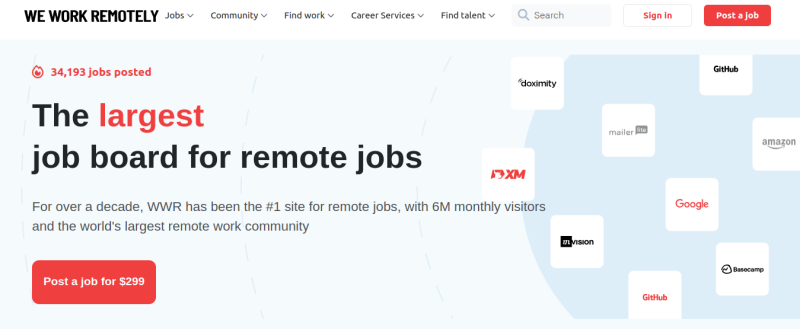We Work Remotely (WWR) is one of the largest and most popular job boards for remote work. It’s been around for over a decade and boasts a large community of remote workers and companies hiring for remote positions.
Thank you for reading this post, don’t forget to subscribe!
Please support the blog by clicking ads and join the monetize programs , coming soon.
Here’s what you need to know about the WWR job board:
Key Features on We Work Remotely:
- Wide Range of Jobs: WWR features a diverse selection of remote jobs across various categories, including programming, design, marketing, customer support, writing, and more.
- Simple Interface: The website has a clean and easy-to-navigate interface, making it simple to search for jobs and filter by category, location, and other criteria.
- High-Quality Jobs: WWR generally has a good reputation for featuring legitimate and well-paying remote jobs.
- Large Community: The platform has a large and active community of remote workers, which can be a valuable resource for job seekers.
- Focus on Remote-First Companies: Many of the companies that post on WWR are remote-first or have a strong remote work culture.
The remote work culture
The remote work culture and lifestyle represent a significant shift from traditional office-based work, offering both unique advantages and challenges. First of all, Flexibility and Autonomy: Remote work often provides greater flexibility in terms of work hours and location. This allows individuals to tailor their work schedule to their personal preferences and responsibilities.
Results-Oriented: Emphasis is typically placed on achieving goals and deliverables, rather than strict adherence to set hours. Communication is Key: Effective communication tools and practices are essential for successful remote work, including regular check-ins, clear expectations, and responsive communication. Trust and Accountability: Remote work relies heavily on trust between employers and employees. Individuals are accountable for managing their time and productivity effectively.
Collaboration and Connection: While remote work can be isolating, many companies foster a sense of community through virtual team-building activities, online social events, and regular communication. Lifestyle has many options to offer like Work-Life Integration: Remote work can blur the lines between work and personal life. It offers the potential for better work-life balance, but requires conscious effort to maintain boundaries.
Location Independence: One of the biggest perks is the ability to work from anywhere with an internet connection. This can enable travel, living in preferred locations, or simply working from the comfort of home. Productivity and Focus: Remote work can enhance productivity by eliminating distractions and allowing for a personalized work environment. However, it requires self-discipline and effective time management. Well-being and Self-Care: Remote work provides the opportunity to prioritize well-being by incorporating exercise, healthy meals, and breaks into the workday. Continuous Learning: Remote workers often need to be proactive in staying up-to-date with new technologies and skills to remain competitive. Also, it requires freelancers the following skills and mindset: Strong self-discipline and time management skills. Effective communication and collaboration strategies. Proactive approach to maintaining well-being and professional development.
How to Use We Work Remotely WWR:
- Visit the Website: Go to weworkremotely.com
- Browse Jobs: You can browse jobs by category or use the search bar to find specific roles.
- Filter Your Search: Use the filters to narrow down your search by location, experience level, and other criteria.
- Create an Account (Optional): You can create an account to save jobs, set up job alerts, and track your applications.
- Apply for Jobs: When you find a job that interests you, click on the listing to learn more and apply through the provided instructions.
Tips for Using WWR:
- Check Regularly: New jobs are posted frequently, so it’s a good idea to check the site regularly.
- Set Up Job Alerts: This will notify you when new jobs that match your criteria are posted.
- Tailor Your Applications: Make sure to tailor your cover letter and resume to each specific job you apply for.
- Be Patient: Finding the right remote job can take time, so don’t get discouraged if you don’t hear back right away.
Other services offered on We Work Remotely
Besides jobs, the website offers resume review by professionals to make sure your CV looks fantastic. And also the website offers job search automation to easily catch up with new posts according to your skills. But no chat nor helpdesk representatives are offered here. Maybe checking the community blog can be warming for newcomers to learn more about how things get done.
Countries of jobs and job seekers on We Work Remotely
In the context of good communications, job location even though it is remote , can be a very hard point of job daily tasks. Many time zones are not friendly with each other and some people are having day and night different routines. So be careful when choosing a job with +4 or +5 time zone shifts since that will affect your delivery of everything work related, not only emails. Many think it is working outside the USA, maybe in EU lands! But the fact is the jobs are still in the US zone , residents of US only can apply but they work remotely, which is a mechanism I can’t find out why it exists.
We Work Remotely (WWR) is a global job board, and people from most countries can apply for jobs listed there. However, there are some exceptions and restrictions to be aware of:
General Rule:
Worldwide Applications: Most job postings on WWR are open to applicants from anywhere in the world. This is especially true for roles that can be performed entirely online, such as programming, design, writing, and customer support.
Exceptions and Restrictions:
- Location-Specific Roles: Some jobs may require applicants to be located in a specific country or region due to legal, tax, or operational reasons. These restrictions are usually clearly stated in the job description.
- Company Policies: Certain companies may have their own internal policies regarding hiring international employees, which could limit the countries from which they accept applications.
- Visa and Work Permit Requirements: It’s important to be aware of the visa and work permit requirements for the country where the company is based, as this could affect your eligibility for the job.
How to Determine Eligibility to work on We Work Remotely:
- Read the Job Description Carefully: Always pay close attention to the job description for any location restrictions or requirements.
- Check the Company Website: If you’re unsure about a company’s hiring policies, visit their website or contact their HR department for clarification.
- Research Visa Requirements: If you’re considering applying for a job in a different country, research the visa and work permit requirements to ensure you meet the eligibility criteria.
Tips for International Applicants:
- Highlight Relevant Skills: In your application, emphasize any skills or experience that demonstrate your ability to work effectively in a remote and international environment.
- Be Prepared for Time Zone Differences: Be aware of potential time zone differences and be flexible with communication and meeting schedules.
- Demonstrate Cultural Awareness: Show that you’re aware of and respectful of cultural differences in communication and work styles.
While there may be some exceptions, the majority of jobs on WWR are open to applicants from around the world. By carefully reviewing job descriptions and doing your research, you can determine your eligibility and increase your chances of success in your remote job search.
Common challenges of remote work in general
While remote work offers many benefits, it’s important to be aware of the potential downsides. Such as these type of the common disadvantages:
1. Isolation and Loneliness: Lack of Social Interaction: Working from home can lead to feelings of isolation and loneliness due to reduced face-to-face interaction with colleagues. Difficulty with Team Cohesion: Building strong relationships and team cohesion can be more challenging when communication is primarily virtual.
2. Communication Challenges: Misinterpretations: Communication can be less clear and nuanced without in-person cues like body language and facial expressions. This can lead to misunderstandings and misinterpretations. Over-reliance on Technology: Technical difficulties or limitations with communication tools can hinder productivity and collaboration.
3. Blurred Work-Life Boundaries: Difficulty “Switching Off”: It can be harder to separate work life from personal life when your home is also your office. This can lead to longer work hours and difficulty relaxing. Distractions at Home: Household chores, family members, and other distractions can interfere with focus and productivity.
4. Self-Discipline and Time Management: Procrastination and Distractions: Remote work requires strong self-discipline and time management skills to avoid procrastination and distractions. Maintaining Motivation: Some individuals may find it harder to stay motivated and focused without the structure of a traditional office environment.
5. Career Development and Visibility: Limited Networking Opportunities: Remote workers may have fewer opportunities for networking and building relationships with colleagues and superiors. Reduced Visibility: It can be harder to showcase your work and contributions when you’re not physically present in the office.
6. Technical Challenges: Reliable Internet and Equipment: Remote work requires reliable internet access and appropriate equipment, which can be a challenge for some individuals. IT Support: Troubleshooting technical issues can be more difficult without on-site IT support.
7. Other Potential Drawbacks: Increased Utility Bills: Working from home can lead to higher electricity and heating/cooling costs. Sedentary Lifestyle: It’s important to be mindful of physical activity and avoid a sedentary lifestyle when working remotely. It’s important to note that these disadvantages can be mitigated with proactive strategies and good communication. Many companies and individuals successfully navigate these challenges and thrive in remote work environments.
Jobs types and fields on We Work Remotely
We Work Remotely (WWR) is a global platform, so the jobs listed there span various countries. However, some trends and commonalities exist regarding the types of jobs and where they’re based.
Common Job Titles on We Work Remotely:
- Software Developers: This is consistently one of the most in-demand roles on WWR, with a wide range of specializations (e.g., front-end, back-end, full-stack, mobile).
- Designers: Various design roles are prevalent, including UX/UI designers, graphic designers, web designers, and product designers.
- Writers and Content Creators: Demand for remote writers and content creators is high, encompassing copywriters, technical writers, content marketers, and editors.
- Customer Support Specialists: Many companies seek remote customer support representatives to handle customer inquiries and provide assistance.
- Marketing Professionals: Digital marketing specialists, social media managers, SEO experts, and marketing automation specialists are frequently sought.
- Sales Representatives: Remote sales roles are common, including inside sales, business development, and account management positions.
- Virtual Assistants: Many businesses and entrepreneurs hire virtual assistants to provide administrative, technical, or creative support.
- Project Managers: Remote project managers are needed to oversee and coordinate projects across various industries.
Countries with Frequent Job Postings on We Work Remotely:
- United States: A significant portion of the jobs on WWR are based in the US, particularly in tech hubs like San Francisco, New York, and Austin.
- United Kingdom: The UK is another major source of remote job opportunities, with London being a primary hub.
- Canada: Canada has a growing remote work scene, with companies in Toronto, Vancouver, and Montreal often hiring remotely.
- Australia: Australia is becoming a popular destination for remote workers, and many companies there embrace remote work arrangements.
- Europe: Various European countries, including Germany, Netherlands, and Spain, offer remote job opportunities across different sectors.
- Worldwide: Many jobs on WWR are truly location-independent, allowing individuals to work from anywhere in the world.11
Factors Influencing Job Location :
- Company Headquarters: The location of a company’s headquarters often influences where they hire remote employees, although many companies are embracing a global workforce.
- Industry: Certain industries, like technology and marketing, tend to be more open to remote work and hire from a wider range of locations.12
- Specific Role Requirements: Some roles may require employees to be located in a specific region due to legal, tax, or operational reasons.
While these are some general trends, it’s important to remember that WWR features a diverse range of jobs and companies from all over the world. By exploring the platform and using its search filters, you can find remote opportunities that match your skills and location preferences. With fees like that , almost 300$US , things must be serious on getting talents, so be ready for the ride with WWR.
More resources
- We Work Remotely | Frequently Asked Questions.
- We Work Remotely
- We Work Remotely | Blog
- More on working online blog here






Leave a Reply